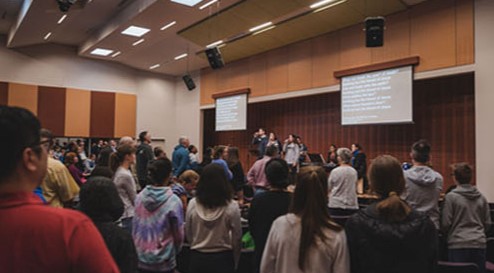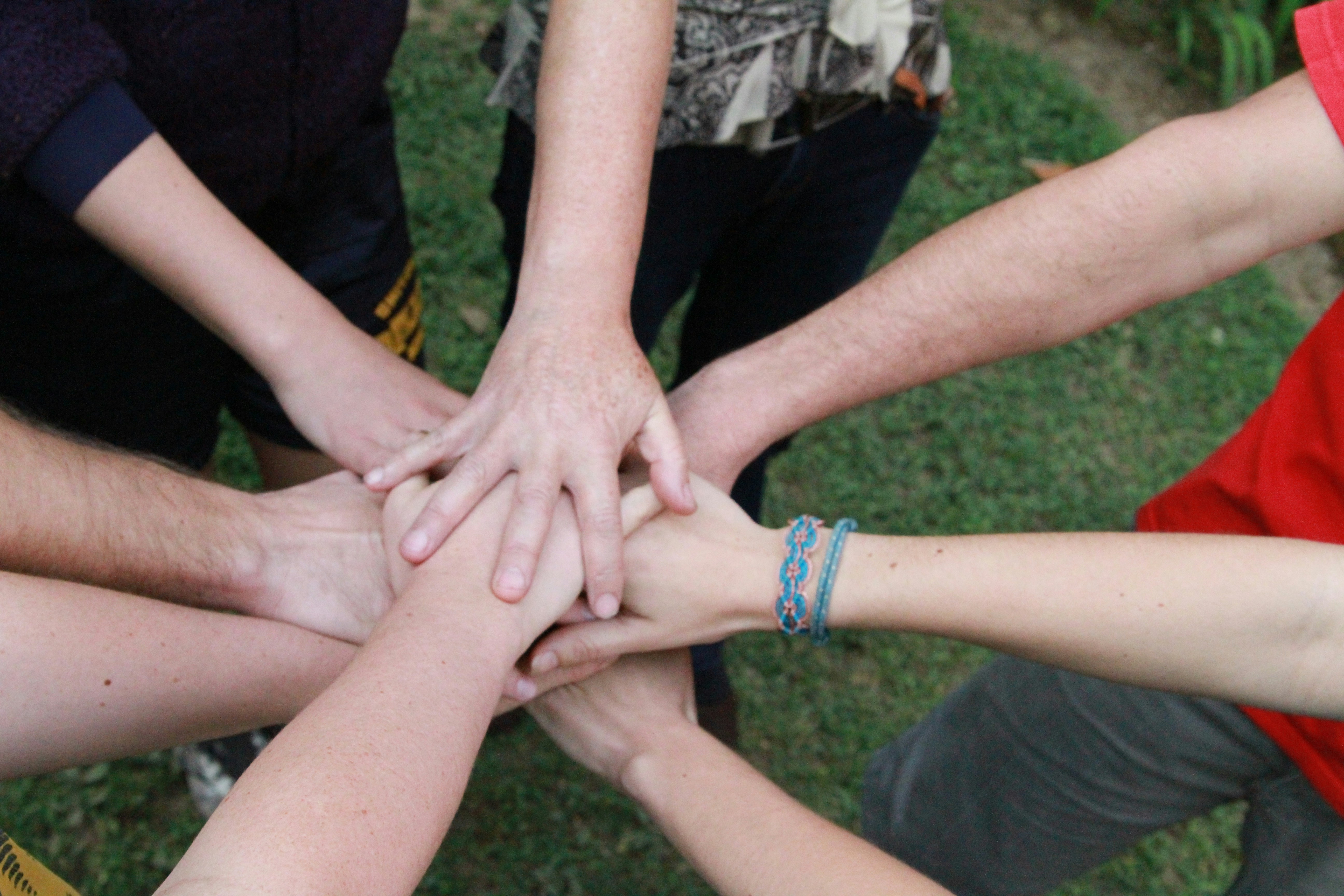AUDIO RECORDING

WRITTEN TRANSCRIPT
Friday Communication - 25th August 2023
The New Testament letters are rich in ‘one anothers’, multifaceted expressions of the command of our Lord to love one another, a command repeated frequently in the New Testament [John 13:34-35; Colossians 3:13-14;1 Peter 1:22, 4:8; 1 John 4:7]
The one anothers
You probably know many of them.
Romans 15: 7 Therefore welcome one another, just as Christ also welcomed you, to the glory of God.
Paul talks of the Roman believers as Romans 15: 14 My brothers and sisters, I myself am convinced about you that you also are full of goodness, filled with all knowledge, and able to instruct one another.
Galatians 5: 13 For you were called to be free, brothers and sisters; only don’t use this freedom as an opportunity for the flesh, but serve one another through love.
Galatians 6: 2 Carry one another’s burdens; in this way you will fulfill the law of Christ.
Ephesians 4: 32 And be kind and compassionate to one another, forgiving one another, just as God also forgave you in Christ.
Colossians 3: 16 Let the word of Christ dwell richly among you, in all wisdom teaching and admonishing one another through psalms, hymns, and spiritual songs, singing to God with gratitude in your hearts.
1 Thessalonians 5: 11 Therefore encourage one another and build each other up as you are already doing.
Hebrews 3: 13 But encourage each other daily, while it is still called today, so that none of you is hardened by sin’s deception.
Hebrews 10: 24 And let us consider how we may spur one another on toward love and good deeds, 25 not giving up meeting together, as some are in the habit of doing, but encouraging one another—and all the more as you see the Day approaching. [NIV]
1 Peter 4: 9 Be hospitable to one another without complaining.
Our health as individual believers and as a congregation depend on the practice of these and that is why as a congregation and as individuals the third area we prioritize as we come out of Covid along with our Sunday services and Youth and Childrens ministries is our growth groups.
The need for Growth Groups
The ‘one anothers’ remind us that the Lord has given us to each other to help us live fruitful and faithful Christian lives which bring Him honour and which persevere until the end of our race, persevere to receive the crown of glory [2 Tim. 4:6-8]. The Christian life has never been a spectator sport, and the growth of the church has never been dependent on one or two talented individuals. WE grow as ‘each part does its work’ Eph. 4:16.
But we cannot practice the ‘one anothers’ if we are strangers to each other, or if our conversation with each other is restricted to the occasional incidental conversation at a Sunday service. And there are features of our congregation and modern suburban life that make meeting together intentionally in a small group that is focused on encouraging each other from God’s word – that is our growth groups – even more necessary. On a Sunday there can be a lot of people to say hello to, and if you are new you can be meeting strangers for quite a while. There are also a lot of distractions on a Sunday, especially if you have children to keep an eye on after the service. If Sunday is your only contact with those Christian brothers and sisters whom you know there can be a reluctance to really engage with those who are new, for you yourself are starved of Christian companionship. In a larger congregation, especially where there is a degree of irregularity for all sorts of reasons – like frequent sickness in children – it can be hard to build the trust needed to practice well the one anothers with contact only on Sundays.
And suburbia is an environment where we may not see other members of the congregation during the week, let alone meet them in contexts where we can build relationships. Our homes are distributed across a number of suburbs, we work in a range of locations through greater Melbourne, and our children are in a number of different schools. Mobility is also a feature of Australian suburban life. We have brothers and sisters joining us from other parts of Melbourne – for example where they have moved out of the inner city to start a family; or from the country, for work or study; from interstate and overseas. Church is our family, and for some the only family – but it is hard to feel at home in a family where you don’t know anyone, have no-one to share your life with. New believers have often lost their former community, or become distanced from it, because of their commitment to the Lord Jesus. It is hard to feel encouraged and supported if there is no opportunity to form relationships with other believers.
The absolute necessity of practicing the ‘one anothers’ – they are commands after all; the features of our Sunday service; the realities of modern suburban living in a mobile society, all make the need for growth groups obvious, groups which are small enough to make conversation easy and consistent enough to allow genuine relationships to be formed over time; groups which are intentionally Christian groups, gathered with the purpose of encouraging and teaching one another by gathering around God’s word; groups where no-one is overlooked; groups where we can give thanks together for God’s provision and pray together about personal needs.
We always as a church need to be prioritizing regular small group meetings, our growth groups. But we face some challenges both in maintaining a sufficient number of groups, and in maintaining our own participation.
Challenges to our growth groups
There are stage of life challenges, especially where we have children. It is more work at home when one parent is out at a growth group, hosting groups becomes more difficult with children at home, and we have found it hard to maintain groups in which we can include our families. There are some ways of adapting that helps us get through this stage, like Having mens and womens groups on alternate nights, or some groups continuing to use Zoom, especially where there are other activities that promote face to face meetings – like picnics or coffee together. But it takes determination.
Then there are what I call ‘forgetting’ challenges. When we have been in a congregation for a while we do have established and encouraging Christian relationships and in our busy lives we find these enough. We can then start to think of growth group as just one other thing, and not needed by us. I call this the forgetting challenge, because stopping growth group involves forgetting what it is like to be a newcomer to a congregation, or to be a new believer, and the difficulty of establishing relationships which can encourage and sustain us. And it also forgets our need to give and receive intentional encouragement throughout our Christian lives, a life where it is possible to drift from our focus on Christ and to narrow our love to just those we find it easy to like.
And at the moment as we come out of Covid we face a leadership challenge, people willing to accept responsibility to run the group. We have more people wanting to join groups than we have spaces in our groups. And many of those groups are too large, making it that little bit easier to be irregular and that little bit harder to form good relationships. We are so encouraged and thankful for all our leaders and the love they show their brothers and sisters, but we do need more to put their hand up to serve their brothers and sisters in this way. There can be all sorts of reasons for reluctance to lead including those already mentioned – stage of life, forgetting, but also lack of confidence, uncertainty about our suitability. Covid did disrupt our training of growth group leaders which can address that uncertainty. Clinton is working hard to overcome that disruption by seeking new leaders to train – so if you are interested in leading or coming back to lead, please contact him.
The Lord Jesus has given us to each other to help us grow and persevere as His followers, and He has commanded each of us to practice together the ‘one anothers’ of Scripture for our good. That practice is facilitated by knowing and trusting each other. Committing yourself to a growth group, intentionally creating a context for yourself and your brothers and sisters to encourage and teach each other from God’s word, is both practicing the one anothers and making their practice easier in every other context where we meet. So make growth group a priority in your week as we seek to make the participation of as many as possible in growth groups a priority for our church.
RECENT POSTS





